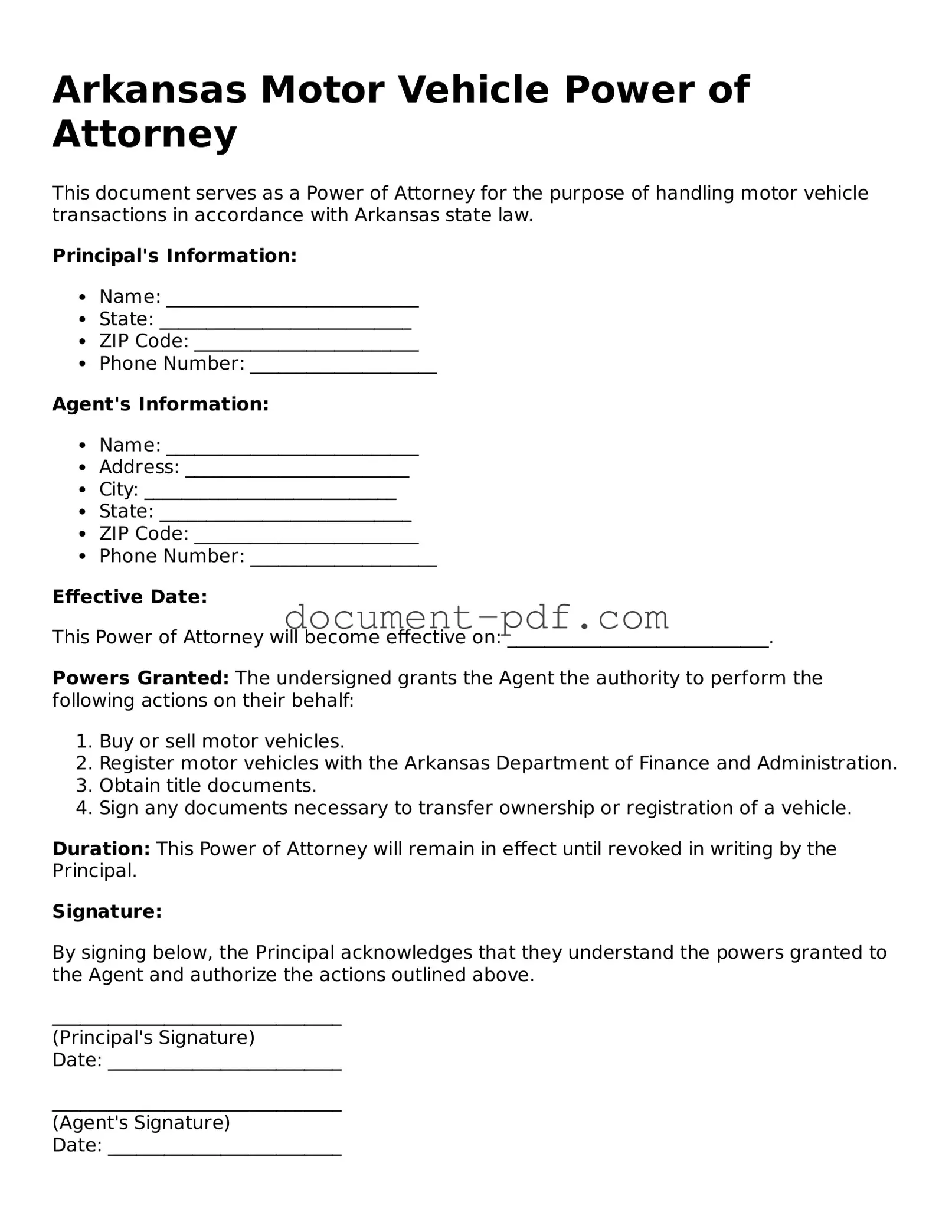The Durable Power of Attorney is a legal document that allows one person to act on behalf of another in various matters, including financial and legal decisions. Like the Arkansas Motor Vehicle Power of Attorney, it grants authority to an agent, but its scope is broader. This document remains effective even if the principal becomes incapacitated, ensuring that the agent can continue to manage the principal's affairs without interruption.
The General Power of Attorney serves a similar purpose by allowing an individual to designate another person to handle a wide range of decisions. While the Arkansas Motor Vehicle Power of Attorney is specifically focused on vehicle-related matters, the General Power of Attorney can cover everything from real estate transactions to banking. It is important to note that this document typically becomes invalid if the principal loses capacity unless it is specified as durable.
The Healthcare Power of Attorney allows an individual to appoint someone to make medical decisions on their behalf. This document parallels the Arkansas Motor Vehicle Power of Attorney in that it provides authority to an agent. However, the focus here is on health care and medical treatment rather than vehicle transactions. Both documents empower an agent to act in the best interest of the principal when they are unable to do so themselves.
The Limited Power of Attorney restricts the agent's authority to specific tasks or timeframes. Similar to the Arkansas Motor Vehicle Power of Attorney, it is often used for particular transactions, such as selling a vehicle or managing a property. This document allows the principal to maintain control over their affairs while delegating specific responsibilities to an agent for a defined purpose.
The Vehicle Bill of Sale is a document that records the sale of a vehicle. While it does not grant power of attorney, it is related in that it often requires a power of attorney to facilitate the transfer of ownership. Both documents play a role in vehicle transactions, but the Vehicle Bill of Sale serves as proof of the sale, whereas the Arkansas Motor Vehicle Power of Attorney enables someone to act on behalf of the vehicle owner during the sale process.
The Affidavit of Heirship is used to establish the heirs of a deceased person. It can be similar to the Arkansas Motor Vehicle Power of Attorney when dealing with the transfer of a vehicle after someone has passed away. While the power of attorney allows for the management of a vehicle during the owner's lifetime, the affidavit helps clarify ownership and rights to the vehicle after death, facilitating the transfer of title to heirs.
For those navigating the complexities of real estate transactions, understanding the Colorado Real Estate Purchase Agreement form essentials is vital. This document outlines crucial terms between buyers and sellers, ensuring that all parties involved are informed and protected throughout the buying process.
The Trust Agreement allows a person to place their assets into a trust, managed by a trustee for the benefit of beneficiaries. This document is similar to the Arkansas Motor Vehicle Power of Attorney in that it designates someone to manage assets, including vehicles. However, a trust can provide more comprehensive management of assets and can continue after the grantor's death, unlike a power of attorney, which typically ceases upon death.
The Quitclaim Deed is a legal instrument used to transfer interest in real property. It is similar to the Arkansas Motor Vehicle Power of Attorney in that it often requires a power of attorney to execute the transfer if the property owner cannot sign the deed themselves. Both documents facilitate the transfer of ownership, but the Quitclaim Deed specifically pertains to real estate, whereas the power of attorney is focused on vehicle ownership and transactions.

